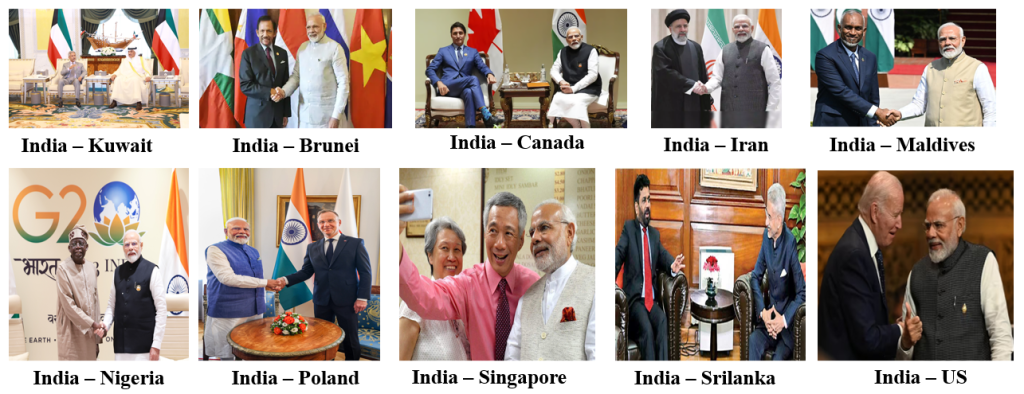Navigation of Geopolitical Challenges with steely resolve

Introduction:
The year 2024 was one of intense geopolitical turbulence, marked by ongoing conflicts, strained alliances, and critical diplomatic negotiations. Amid this chaos, India emerged as a steady force, navigating challenges with a steely resolve. From recalibrating relations with neighboring nations to addressing global crises like the Ukraine war and the Israel-Hamas conflict, India’s foreign policy displayed a delicate balance of pragmatism and ambition. This article delves into the key milestones, setbacks, and future agenda shaping India’s global strategic stance.
Context:
- 2024 as a year was marked by geopolitical tensions and too much turbulence.
- However, India in 2024 shifted gears in expanding its strategic heft in the neighborhood and beyond with a steely resolve.
- It also navigated the two most consequential crisis: The war in Ukraine and the Israel-Hamas conflict.
High Points of India’s Foreign Policy:
- India-China relations:
- a. The end of the military face off between India and China along the line of actual control in eastern Ladakh was the high point.
- b. Galwan Clash of June 2020 pushed their relations to their lowest point in 6 decades.
- c. Meeting between PM Modi and Chinese President Xi Jinping on the margins of the BRICS Summit on October 23.
- d. Revival of various bilateral dialogue mechanisms.
- e. In November, the Special Representatives on the border issue held talks in Beijing (first dialogue under the framework of Special Representatives in nearly 5 years).
- f. Both focused on positive direction for cross border co operation including resumption of Kailash Mansarover Yatra, River Data Sharing and Border Trade.

- India-Pakistan relations:
- External Affairs minister S. Jaishankar travelled to Islamabad in October to attend a summit of the SCO.
- First such visit from India to Pakistan in nearly a decade.
- Brief interaction between Indian foreign minister with Pakistan Prime Minister Shehbaz Sharif and Foreign Minister Ishaq Dar triggered hopes of better ties.
- Focus more on the neighborhood:
- Top leaders from India’s neighborhood and the Indian Ocean region graced the swearing-in ceremony of PM Modi.
- Pro-China leaders helming governments in Maldives and Nepal created some problems:
- 1. Following insistence of Maldivian President Mohamed Muizzu, India withdrew all its military personnel from the Maldives.
- First Foreign Visit to Russia:
- In his first foreign trip after becoming the prime minister for a third straight term, Modi travelled to Moscow in July.
- In his meeting with President Vladimir Putin, Modi told him that a solution to the Ukraine conflict is not possible on the battlefield and peace efforts do not succeed in the midst of bombs and bullets.
- Modi’s visit to Russia triggered some criticism in the West as the trip came amid global outrage over a Russian missile strike on a children’s hospital in Kyiv.
- In his televised opening remarks at summit talks with Putin in the Kremlin, Modi said killing of innocent children is heart-wrenching and very painful.

- Modi’s Visit to Ukraine:
- In August, Modi travelled to Ukranian capital city of Kyiv.
- Indian PM stated that Ukraine and Russia should sit together without wasting time to end the ongoing war and that India was ready to play an “active role” to restore peace in the region.
- The prime minister said India was on the side of peace since the beginning of the conflict and he would even like to contribute personally for a peaceful resolution of the crisis.
- Modi’s nearly nine-hour visit to Ukraine was the first by an Indian prime minister since its independence in 1991.
- India-Qatar:
- In February, Qatar released eight jailed former Indian Navy personnel and seven of them returned home.
- It was seen as a major diplomatic victory for India that came nearly three-and-half months after a Qatari court handed them death sentence.
- India-France Relation:
- French President Emmanuel Macron attended Republic Day as the chief guest, solidifying India-France cooperation in defence, energy, and maritime sectors.
- While India aimed to host U.S. President Biden and the Quad summit, Macron’s visit reinforced bilateral dependability.
- Progress on Trade Agreements:
- The conclusion of the India-European Free Trade Association agreement early in 2024 was a milestone, serving as a template for future FTAs.
- However, no substantial progress was made on agreements with Australia, the U.K., or the EU by year-end.
Low Points of India’s Foreign Policy:
- India-Canada Relations:
- The relations between India and Canada sharply nosedived in the second half of the year.
- Ottawa linked several Indian diplomats including High Commissioner Sanjay Verma to the murder of Khalistani separatist Hardeep Singh Nijjar which was rejected by India.
- India strongly rejected the charges and recalled Verma even as the Canadian government said Indian diplomats were expelled.
- In response India expelled Canadian high commissioner and 5 other diplomats

- Estranged Relations with Bangladesh:
- The ousting of Prime Minister Sheikh Hasina in August marked a significant setback for India-Bangladesh ties.
- Rising attacks on Hindu minorities and Ms. Hasina’s stay in India further strained the once-strong partnership.
- This month, the Yunus-government sent a diplomatic note to New Delhi seeking extradition of Hasina, a move that may further strain the ties.
- India-US Relations:
- Though the overall India-US relations broadly continued to blossom, especially in the domains of defence, critical technologies and clean energy, the ties came under some strain over the so-called “murder for hire” case.
- Two important irritants have emerged:
- a. Indictments against the Adani group.
- b. Linking of an Indian official to the alleged Pannun assassination plot.
- However, the election of U.S. President Donald Trump and his pro-India administration offers a glimmer of hope.
Navigating Global Conflict in 2024:
- Balancing Act in Global Conflicts:
- India maintained a neutral stance, advocating for peace amidst the Russia-Ukraine conflict and Israel’s war in Gaza.
- PM Modi’s visits to Russia and Ukraine sparked speculation about a potential mediatory role.
- Despite meeting Palestinian PM Mahmoud Abbas at the UN and condemning civilian casualties, India avoided explicitly holding Israel accountable at the UN.
- Shifting Focus in West Asia:
- With multilateral initiatives like IMEC and I2U2 facing challenges, India pivoted to bilateral engagements with West Asian nations.
- In 2025, navigating tensions between Iran and the Israel-U.S. alliance will be a key challenge for Indian diplomacy.
Agenda for 2025:
- Strengthening U.S.-India Relations:
- External Affairs Minister Jaishankar’s meetings with the Trump transition team signal a U.S. focus for 2025.
- Key events include President Trump’s visit for the Quad Summit and PM Modi’s potential trip to Washington beforehand.
- Engagement with Iran and iCET Discussions:
- India will host a ministerial visit from Iran early in 2025.
- Followed by U.S. NSA Jake Sullivan’s visit for a crucial iCET (Initiative on Critical and Emerging Technology) meeting.
- High-Profile Diplomatic Visits:
- Indonesian President Prabowo Subianto will be the Republic Day guest, and
- Russian President Vladimir Putin’s first visit to Delhi since the war began is expected to be finalized.
Conclusion:
As 2024 came to a close, India stood at a pivotal juncture in its geopolitical journey. The year was defined by both triumphs and trials, showcasing the resilience and adaptability of its foreign policy. While challenges remain, particularly with Canada and Bangladesh, India’s steadfast commitment to peace and cooperation positions it as a vital player on the world stage. With a forward-looking agenda for 2025, India is poised to further its global ambitions and strengthen its role as a beacon of stability in an uncertain world.






